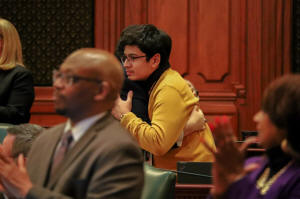Pritzker signs ‘Karina’s law’ to remove guns from domestic violence
situations
 Send a link to a friend
Send a link to a friend
 [February 11, 2025]
By Ben Szalinski [February 11, 2025]
By Ben Szalinski
Karina Gonzalez and her 15-year-old daughter Daniela were shot and
killed on Fourth of July weekend in 2023 at their Chicago home,
allegedly by her husband.
After more than a year of negotiations, Gov. JB Pritzker signed a bill
in her honor Monday that is designed to remove guns from domestic
violence situations.
“As I look forward towards the future, I hope that the future survivors
won’t have to suffer as much as our family and countless others have had
to at the hands of abusers,” said Manny Alvarez, Gonzalez’s surviving
son, at a news conference in Chicago Monday.
House Bill 4144, also known as Karina’s Law, clarifies that local law
enforcement must temporarily remove guns from a person who has an order
of protection against them when the alleged victim successfully seeks
firearm removal as a remedy in court.
Current law allows people asking a court for an order of protection to
request a “firearm remedy” that would lead to law enforcement removing
guns from the alleged abuser’s possession. Karina’s Law closes the
loophole that made it unclear who was responsible for removing the gun
from the situation.
Under the law, the person who seeks an order of protection can also ask
the court to issue a search warrant that will allow local law
enforcement to seize firearms from the alleged abuser. The petitioner or
state’s attorney must demonstrate probable cause that the alleged abuser
poses an immediate threat to the petitioner. Law enforcement would then
be required to execute the warrant within 96 hours of it being issued.
“Taking lethal weapons from those who have already done harm and are an
immediate and present danger to do further harm is simply common sense,”
Pritzker said.

Guns and domestic abuse are a deadly recipe, said Amanda Pyron, CEO of
The Network, an advocacy group that focuses on preventing domestic
violence. Between 2019 and 2023, Illinois saw a 63% increase in
gun-related domestic violence deaths.
“An emergency order of protection is often the first step out of a
violent relationship,” Pyron said. “It can also be the most dangerous
step. This is the time that a survivor faces the most risk because it’s
also the time that the abusive partner realizes he’s losing control.”
Supporters of the law said they hope closing the loophole will make it
safer for victims when they seek a court’s intervention.
“Karina’s Law will protect survivors of domestic violence and give them
comfort – the comfort of knowing that their abuser will not have easy
access to firearms,” Pritzker said.
[to top of second column]
|

Manny Alvarez, son of Karina Gonzalez, hugs Rep. Edgar Gonzalez Jr.,
D-Chicago, in the Illinois House on Tuesday, Jan. 7, 2025. Karina
Gonzalez, the namesake of the legislation, was allegedly shot and
killed by her husband in Chicago in 2023 after receiving an order of
protection. (Capitol News Illinois photo by Andrew Adams)

The nation’s high court upheld a federal law last June that prohibits
people with domestic violence-related restraining orders from having
guns. Though Karina’s Law had previously passed through the House last
spring, senators delayed action while waiting for the decision.
“I was relieved when the court gave us far more elbow room than I would
have expected to tackle this issue, and now we have, and we’ve done it
in a matter that is effective and constitutional,” Senate President Don
Harmon, D-Oak Park, said.
Though the bill received bipartisan support, some gun rights groups and
Republican lawmakers expressed concerns the bill undermines due process
afforded to people accused of crimes. They argued taking guns away from
a person with an order of protection against them assumes guilt on
criminal charges and violates their constitutional rights. Orders of
protection are filed in civil court.
“This policy sends a clear message to those living through trauma and
the terror of domestic violence,” Rep. Maura Hirschauer, D-Batavia,
said. “Here in Illinois, we see you. You have the absolute right to
leave your abuser and we will do our best to keep you and your family
safe. And most importantly, here in Illinois, we value your life and the
life of your families more than we value your abuser’s gun.”
Illinois law enforcement organizations also had concerns about their
ability to carry out the law, including where police agencies would
store the confiscated firearms and the logistics of carrying out search
warrants against alleged abusers.
Law enforcement organizations and lawmakers came to an agreement over
those logistics. If a victim has not made any reports of domestic
violence to police within the last three months, police will have 48
hours to research the situation behind the order of protection and make
any changes to the search warrant. Warrants then must be executed within
96 hours of any changes.
The person who has an order of protection against them will also be able
to petition the court to have the gun transferred to another person who
can lawfully possess a firearm. Maralea Negron, director of policy for
The Network, said this is designed to help smaller sheriff’s offices
that don’t have capacity to store guns.
Capitol News Illinois is
a nonprofit, nonpartisan news service that distributes state government
coverage to hundreds of news outlets statewide. It is funded primarily
by the Illinois Press Foundation and the Robert R. McCormick Foundation. |